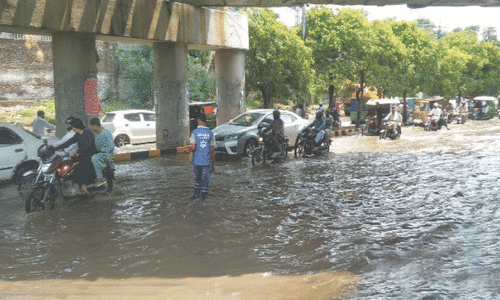According to Punjabi calendar four months constitute winter: Magghar, Poh, Maagh and Phaggan (mid-November to mid-march). In the near past we had onset of winter by end of September and it would usually peak in December/January wrapping everything in frost and mist. Subsequently one would see indoor activities increased. Secondly, it would bring human beings closer. Human warmth would be a shield against the biting cold. It would help create intimacy among couples and lovers.
Look how Baba Farid (1173-1265) describes some months of the year: “In (the month of) Katak the cranes, in (the month of) Chet the fire (riot of colours), in (the month of) Sawan the lightning! And in winter one’s arms around the beloved’s neck are a sight worth seeing.” The scene stands in marked contrast to what we see in summer. In summer we keep some distance from each other as heat, dust, sweat and perspiration make it necessary for us to not make others suffer our smell.
Punjab has been an agrarian society for thousands of years which has made it acutely aware of seasonal changes because they have direct bearing on the production process that is exposed to the vagaries of the weather. The farmers have to be aware of when to sow and what to sow.
Waris Shah in his Heer describes what has been part of folk-wisdom born of collective memory. He refers to seasons and months in the context of activities of agricultural society thus: “The rain in Jayth is bad, so is the wind in the winter, and dust storms are forbidden in the months of Katak and Maangh (Jayth meenh, siyal nu va mandi, Katak Maangh vich manaa anehrian ne).” Jayth (mid-May to mid-June) is the month when wheat crop is thrashed in the fields. The rain can destroy the harvest. Siyal (winter) with its wind can cause the seedlings to shrivel and wither in its icy grip. Duststorms in Katak and Maangh (mid-October to mid-November, and mid-January to mid-February) can destroy the crops.
Describing his heroine’s agony in separation Waris Shah says: “My body shivers in the month of Poh / alone I sleep in my bedchamber (Poh Maah vich kanbdi jaan meri / mein ikallri saej te sauwani haan).”
But now if you look around, you shall find that things have changed quite a lot. Traditional landscape has simply evaporated in the wake of strengthened anthropocentric attitudes and increased activities. We think everything we have on our planet is meant for us; we can grab it and use it least concerned about the consequences. In primitive and under-developed societies like ours such a narrow view of life is backed by anachronistic ideology premised on the conquest of nature. It totally disregards certain facts of paramount importance. One, planet earth is not solely meant for humans. It has millions and millions of species which have equal rights on it as they are its products. Not only living creatures, inanimate things have essential role in the natural scheme of things which we tend to obfuscate in our human greed. In our part of the world which doesn’t have significant role in the process of climate change, we with the lack of future vision have locally made the situation worse for ourselves.
Four factors at least need to be reckoned with. One, unfettered population growth has economically, socially and culturally created a hopeless mess with multiple implications. Our homeland called Pakistan simply cannot afford to support 220 million people. Result is that we have underfed, illiterate, unskilled masses trampling every nook and corner of the land. Two, pollution and deforestation have disturbed the weather pattern which on the one hand has made it difficult to breathe and on the other have pushed the temperature higher. Now winter is absence of summer. Three, extremely skewed urban planning, driven by land mafia in collusion with the state officials, has made the horizontal expansion of our cities and towns unstoppable which has resulted in the elimination of millions of acres of fertile land that not only provided the direly needed crops but also acted as lungs for our congested urban areas. Prospects of fast buck have blinded those whose job is to make living areas livable and climatically favourable. Four, the ruling elite is intellectually, financially and morally corrupt. Instead of fulfilling its historical duty of leading the people to better tomorrow, it prefers to shamelessly plunder them with the coercive power of the state. The country is little more than a hunting ground for it. It doesn’t even own the country as its tainted wealth --stashed abroad--foreign nationality of their family members and post-retirement life planned in the West irrefutably testify.
In other words, ruthlessly exploitative and extractive colonial and post-colonial politico-economic structures offer people nothing but false promises. The situation has come to such a pass that the hoodwinked now can see false promises as what they are; false. The veneer of hope has begun to crack. So the truncated winter is one of the signs of a much bigger malaise; rot at the core of the system that is meant for the privileges of a few.
Baba Farid describes the predicament we face, symbolically of course: “Farid, the season changes, the forest shudders, and falling leaves have covered all the tracks / I have searched the four corners / No place seems livable.” It’s ironic that humans first have made the earth uninhabitable and now when it is all doom and gloom, they want to make it habitable. Nietzsche rightly warned: “Earth has a disease called man.” Curing the earth means curing the humans. And curing the humans means curing the system that puts vested interest above collective interest. And collective interest lies in the least intrusive relationship with nature. — soofi01@hotmail.com
Published in Dawn, March 13th, 2023












































Dear visitor, the comments section is undergoing an overhaul and will return soon.